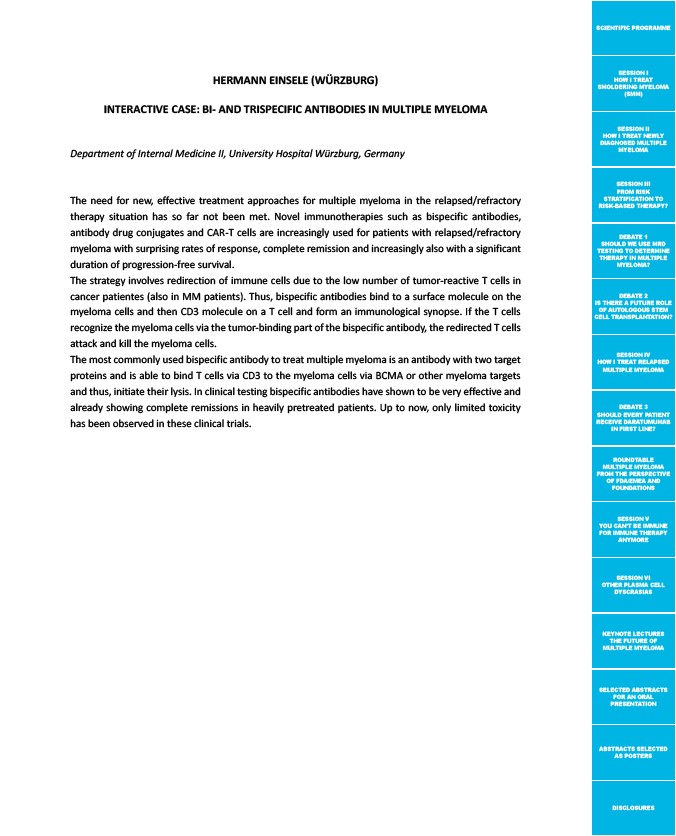
SCIENTIFIC PROGRAMME
SESSION I
HOW I TREAT
SMOLDERING MYELOMA
(SMM)
SESSION II
HOW I TREAT NEWLY
DIAGNOSED MULTIPLE
MYELOMA
SESSION III
FROM RISK
STRATIFICATION TO
RISK-BASED THERAPY?
DEBATE 1
SHOULD WE USE MRD
TESTING TO DETERMINE
THERAPY IN MULTIPLE
MYELOMA?
DEBATE 2
IS THERE A FUTURE ROLE
OF AUTOLOGOUS STEM
CELL TRANSPLANTATION?
SESSION IV
HOW I TREAT RELAPSED
MULTIPLE MYELOMA
DEBATE 3
SHOULD EVERY PATIENT
RECEIVE DARATUMUMAB
IN FIRST LINE?
ROUNDTABLE
MULTIPLE MYELOMA
FROM THE PERSPECTIVE
OF FDA/EMEA AND
FOUNDATIONS
SESSION V
YOU CAN’T BE IMMUNE
FOR IMMUNE THERAPY
ANYMORE
SESSION VI
OTHER PLASMA CELL
DYSCRASIAS
KEYNOTE LECTURES
THE FUTURE OF
MULTIPLE MYELOMA
SELECTED ABSTRACTS
FOR AN ORAL
PRESENTATION
ABSTRACTS SELECTED
AS POSTERS
DISCLOSURES
HERMANN EINSELE (WÜRZBURG)
INTERACTIVE CASE: BI- AND TRISPECIFIC ANTIBODIES IN MULTIPLE MYELOMA
Department of Internal Medicine II, University Hospital Würzburg, Germany
The need for new, effective treatment approaches for multiple myeloma in the relapsed/refractory
therapy situation has so far not been met. Novel immunotherapies such as bispecific antibodies,
antibody drug conjugates and CAR-T cells are increasingly used for patients with relapsed/refractory
myeloma with surprising rates of response, complete remission and increasingly also with a significant
duration of progression-free survival.
The strategy involves redirection of immune cells due to the low number of tumor-reactive T cells in
cancer patientes (also in MM patients). Thus, bispecific antibodies bind to a surface molecule on the
myeloma cells and then CD3 molecule on a T cell and form an immunological synopse. If the T cells
recognize the myeloma cells via the tumor-binding part of the bispecific antibody, the redirected T cells
attack and kill the myeloma cells.
The most commonly used bispecific antibody to treat multiple myeloma is an antibody with two target
proteins and is able to bind T cells via CD3 to the myeloma cells via BCMA or other myeloma targets
and thus, initiate their lysis. In clinical testing bispecific antibodies have shown to be very effective and
already showing complete remissions in heavily pretreated patients. Up to now, only limited toxicity
has been observed in these clinical trials.